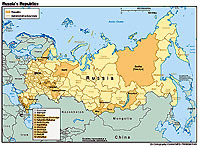Trying to please: The NGO checks are not just political – they are also busy work in action

(Moscow News – themoscownews.com – Anna Arutunyan – April 29, 2013)
Anna Arutunyan is an editor and correspondent at themoscownews.com
As the head of an organization that helps people suffering from cystic fibrosis, an incurable genetic disorder that affects the lungs, Olga Alekina, of the Aid to Patients with Cystic Fibrosis Foundation, wasn’t exactly daunted when prosecutors demanded an explanation for the foreign financing that her organization gets.
After all, she’s had to learn the hard way about dotting her legal I’s: since 2009, her charity fund has been pushing through a tangled bureaucracy to get things done, and get necessary medical help to children.
So when law enforcement asked, she provided all the necessary paperwork. But when prosecutors issued an official warning on April 24 that her organization had broken the law, she was baffled.
Her fund is the latest to be targeted by probes after a law went into effect in November 2012 requiring all NGOs receiving foreign financing and conducting political activity to register as foreign agents. The law came after the Kremlin claimed that foreign organizations were financing political activity in Russia, particularly the mass protests that broke out in 2011. Since March, searches have affected some 256 organizations in 55 regions; the most outspoken critics of the government like the Golos election watchdog were accused of violations.
But Alekina couldn’t quite put together how helping children with cystic fibrosis constituted political activity.
“By law, we are exempt from this, as an organization working in the health sector,” she told me on Monday. “I don’t know how it happened, but there’s a contradiction in the law.”
The prosecutor’s warning cited the organization’s charter, which mentions “making suggestions to government organs” as part of its mission to protect the rights of those sick with cystic fibrosis. Apparently, that was the clause that prosecutors construed as “political activity.” But in a country where there are only about 2,600 registered patients but where the real numbers reach as high as 15,000, according to Alekina “making suggestions to government organs” is just part of what has to be done.
If Alekina’s NGO fails to register as a foreign agent which will drain its already strained resources by making it necessary to conduct additional accounting it will face a fine of up to 500,000 rubles ($15,700).
Alekina is going to challenge the warning.
But there was something else that struck me about Alekina’s approach to the problem: she was seriously put off by the drama that some Russian media outlets were creating around the case, comparing the actions of the authorities against NGOs to Nazism.
“This isn’t a scandal,” she told me of her case. “It’s a mistake.”
Comparing the NGO probes with Nazism or Stalinism not only diminishes the plight of the victims of those repressions, it muddles what is actually happening when a prosecutor goes after an NGO. It supposes that an all-powerful government is deliberately targeting health groups like Alekina’s, ignoring a major part of the problem, which lies in the realm of chaos, confusion, and local officials desperately trying to please their bosses.
We’ve seen this before. Soon after President Vladimir Putin made his famous remark in 2007 about “jackals” looking for grants with foreign embassies, pressure started mounting on regional offices of NGOs like the Memorial Human Rights Society. Putin was expressing what appeared to be an emotional dislike, not a direct order. The remark was not a law, but it acted as one, and the effect came as much from the officials as it did from Putin. They were interpreting the color of his words as a call to action: any work that was not part of the State is automatically suspect and subject to restriction.
The difference now is that there is an actual law. I seriously doubt that the prosecutor issuing a warning to Alekina’s organization saw her NGO as a political agent I believe he was doing busy work. Maybe it really was a mistake, one of the countless mistakes that is behind most of the injustice we tend to blame on evil-doers.
